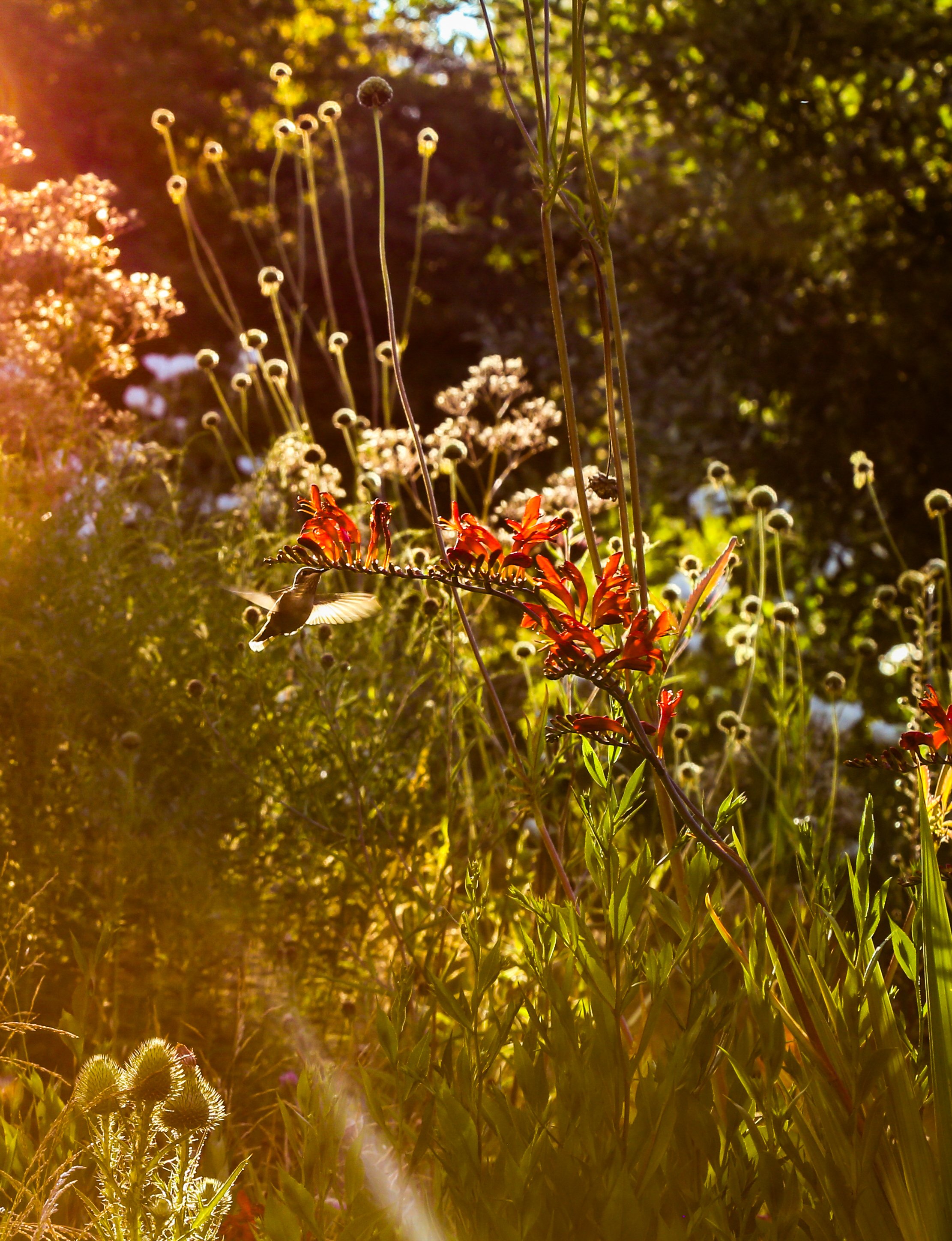(originally posted May 26, 2010)

Heavy coastal fog spilled over the ridges last night blanketing the orchards and burning off just after dawn in great drifts, like magic smoke. Sunlight reflected in puddles on the stony paths and dew dripped like small fat diamonds from the rosebushes. By 9:37 on Tuesday May 18, 2010, it is fair to say the world was sparkling where I stood on Greenwood Ridge.
On mornings like these I think of Victoria. At any time of the year I know I can walk outside and see her hand in something that is blooming or growing, but it is in late spring that her passion for color unfurls as if to shout, Here I am. Look at me.
The little history I know of her does not indicate she was a woman who had time on her hands for passionate pursuits, or, for that matter, leisure of any kind. She lived remotely on the top of a mountain in an age when everything you did to survive pretty much had to be done right where you stood. From morning to night she washed and wrung and hung and ironed and sewed and weeded and picked and stirred and baked and cleaned and tended the animals first thing upon waking, last thing at night. Hers was a small family for an Italian woman, just the two boys and John Cassinelli, her husband. But during the seasons when itinerate workers arrived in the valley for logging, sheep shearing, or (before prohibition) grape picking, she also fed dozens of single men who made their way up the back paths to the door of her kitchen, where she gave them a meal hearty enough to stick to their ribs for a nickel.
She never had a daughter, no one to help with the house or jamming or cooking except on those days when all the families who lived on what was then called Vinegar Ridge gathered. The Fashowers, The Pronsolinos, The Pardinis, The Fratis, The Giovanettis. At those times I imagine a house filled with laughter, pots and pans clanging, bottle after bottle of unlabeled zinfandel passing hands. Had there been womanly touches in the house once, they were long gone by the time I took possession of it. But even if one imagined frilly curtains in the kitchen or a hand loomed rug by the hearth, it would not have brightened what was a resolutely masculine house. Big and dark, with very few windows, a house built in defiance of the cold nights and the long rainy Mendocino winters. Houses with walls of glass to “open” the view are very much a modern construct, not something people who worked their land, and lived the view all day long, thought much about.
When I bought the house and the land on which Victoria had planted her gardens, thirty years had already passed since her death. I was coming from a great metropolis bringing all the mod-coms I thought I needed to survive with me ~ computers, washers and dryers, gourmet restaurant kitchen appliances. I painted the dark paneling white and hauled old iron beds out of the barn for the boys, and painted them white as well. I hired a brilliant couple who had worked in the Queen’s gardens in England, before Alan Chadwick had lured them to northern California, and had them plant formal flower borders like I was channeling Vita, (which I was) with yew hedges that they warned would take decades to reach any ‘significant height.’ I didn’t mind. ‘Significant height’ was exactly what I had come in search of.
Over that first year of innumerable mistakes, slowly but surely Victoria began to make her presence felt.
At first the connection was one of simple appreciation: for the double and single daffodils that sprung up along the road to the house, signaling the end of the rains; for the riot of Matisse colors ~ deep purples and hot pinks ~ that bloomed in what I came to call the shade garden; for the varieties of Azaleas and Camellias she had planted, some as big as small trees. Black bearded Iris, and whole fields of naturalized Ixia would come and go, sometimes making it into a vase and I would wonder when they had been planted, where the tubers or starts had come from.
I also never ceased to marvel at her practicality: like most Italian kitchens there were fruit and nut trees that spiraled out from the back door so at any moment you are only a few steps from that extra Rome needed for a pie, or fat green figs for the cheese, which Victoria had made in the cheese room down in the barn, which I brought up from the city, or from Bert at Boontberry Farms.
 It's possible she saved my life once: One summer evening I was loading a heavy pump on the dolly, late to start dinner, when it slipped and the handles sprang forward, cutting a deep gash above my eye. There was not enough time to call for help but before I could grow afraid I remembered the patch of Comfrey growing on the damp side of the house. My gardener friend had thought Victoria had grown it to staunch wounds, 'an old Indian trick.' The boys rushed outside, grabbing handfuls, which we crushed and stuffed deep into the flap above my eye. The last thing I remember before passing out was Victoria's voice in my ear whispering, tell your boys they did good.
It's possible she saved my life once: One summer evening I was loading a heavy pump on the dolly, late to start dinner, when it slipped and the handles sprang forward, cutting a deep gash above my eye. There was not enough time to call for help but before I could grow afraid I remembered the patch of Comfrey growing on the damp side of the house. My gardener friend had thought Victoria had grown it to staunch wounds, 'an old Indian trick.' The boys rushed outside, grabbing handfuls, which we crushed and stuffed deep into the flap above my eye. The last thing I remember before passing out was Victoria's voice in my ear whispering, tell your boys they did good.
It was after that accident that I began in earnest to look for connections between us: the chicken coop had been built beneath a copse of firs where it was hidden from view. Had Victoria planned the path running to it along the ridge so she could follow her boys as they made the journey to collect eggs every morning ~ as I did mine? There was a straighter route, but one that did not afford the same view. I knew that even if we had lived at the same time in history, Victoria and I couldn’t have been more different, culturally or temperamentally, and probably would not have been friends. But that never stopped me wondering how she might resolve situations that I knew she had faced in that very same spot. A sick child in the night and no doctor within easy reach drives the same wedge of fear in a young mother’s heart, no matter what century she lives in, or to which god she prays.
The irony is that with all my education and relative wealth I was adrift in a terrain that she had mastered with no such ‘resources’. Significant height, remember? A Jeep took me to town, not a horse and buggy; when the crops failed I went to the supermarket. But what if there was suddenly no supermarket? I had circumnavigated the world, speaking in tongues, but when it came to understanding the rhythms of a simple existence on the ridge, nothing life had taught me thus far gave me the upper hand. More and more I found myself taking the measure of my day against the faint pattern of hers, as, and when, I could discern it.
For the most part, our farm was a series of outbuildings that served masculine endeavors ~ building, chopping, fixing things. You could go from one shed to another all day long and come upon old and rusted things men had touched: from the lower barn which was dark and dank, its hand hewn redwood beams soaked black by a century of tractor oil, to the wood shed with its wall full of saw blades, some as big as 8’ across, to the tool shed with its cabinets of screw boxes, chains, and hand hewn tools. I never found many things that were hers though: a potato masher with a chipped red handle, a set of framed flower prints, pillow cases from Sears Roebuck catalogue printed with tiny cowboy guns, hats and boots (which Tex loved and claimed), and a prized treasure: a framed picture of Jesus as a handsome young man who looked like he didn’t have a care in the world. I showed it to my mother when she came to visit she said oh look, a picture of Jesus with bedroom eyes.
My mother would have made friends with Victoria, of this I have no doubt. But then she had a talent for looking beyond differences in language, culture, ethnicity and religion. Differences we make into obstacles between ourselves and other people, in spite of what we know of the importance of human kinship. I do not have that talent down yet, but I'm trying. Survival is a collaborative enterprise. At the end of the day we all have another night of total darkness to consider. It comforts me knowing Victoria was up here once, thinking it all through, before me.





